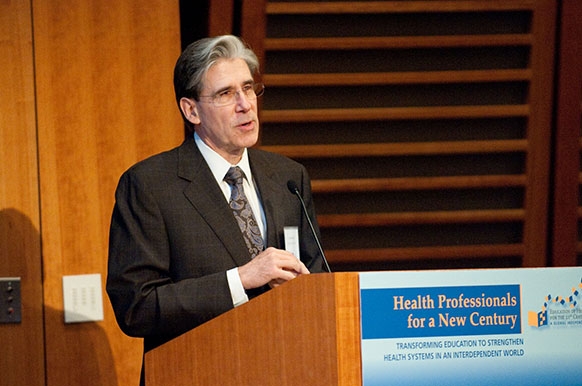Health Professionals for the 21st Century

About the Commission
The Commission on the Education of Health Professionals for the 21st Century—a global independent initiative—was launched in January 2010 to landscape the field of professional health education, identify gaps and opportunities, and make recommendations for a new generation of reforms a century after the landmark Flexner Report of 1910. This independent initiative was led by co-chairs Julio Frenk and Lincoln Chen, working with 20 leaders from diverse disciplinary backgrounds, institutional affiliations, and regions of the world. Over the course of 2010, the Commission conducted research, deliberated, and promoted consultations. The brevity of time shaped the scope and depth of consultations, data compilation, analyses, and research. Commissioners articulated a fresh vision with practical recommendations for specific actions to transform the education of health professionals in all countries. Calling for major reform in the training of doctors and other healthcare professionals, the report of the Commission was published by The Lancet on 29 November 2010. It was publicly released at a symposium hosted by the Harvard School of Public Health, 30 November - 1 December 2010.
The idea of the Commission emerged from a series of conversations that Commission co-chairs Julio Frenk and Lincoln Chen had with Harvey Fineberg, from the Institute of Medicine, and Jaime Sepulveda and Kathy Cahill from the Bill & Melinda Gates Foundation. A Scientific Advisory Committee with 14 members and 25 Youth Commissioners also provided valuable inputs. The co-chairs supervised the research and management teams operating out of the China Medical Board and the Harvard School of Public Health. The Commission was sponsored by the Bill & Melinda Gates Foundation, the Rockefeller Foundation and the China Medical Board.
Members of the Commission on Education of Health Professionals for the 21st Century
Co-Chairs: Julio Frenk & Lincoln Chen
Commissioners (in alphabetical order): Zulfiqar A. Bhutta, Jordan Cohen, Lord Nigel Crisp, Tim Evans, Harvey Fineberg, Patricia Garcia, Richard Horton, Patrick Kelley, Huda Zurayk, Barry M. Kistnasamy, Afaf I. Meleis, David Naylor, Ariel Pablos-Mendez, Srinath Reddy, Susan Scrimshaw, Jaime Sepulveda, David Serwadda, Ke Yang
Major Findings:
- Insufficient funding. There is a global crisis in the education of health professionals—doctors, nurses, public health professionals—because there is insufficient funding to train the kind of health professionals that complex health systems demand today. In addition, we get little value for the money that is invested. The total global expenditure for health professional education is about US$100 billion per year, less than 2% of health expenditures worldwide.
- Mismatch between health needs and supply of health professionals. There is no correlation between the burden of disease and number of medical schools, nursing schools, and public health programs. The poorest parts of the world often lack any capacity to train health professionals.
Key Recommendations:
- The Commission calls for a broad reform movement, encompassing instructional design (what we teach and how) and institutional design (schools or universities that should carry out instruction).
- Instructional design – the approach should be competency-based and inter-professional, bringing together health professionals to work as a cohesive team. It should use IT to empower health professional during training and in the field.
- Institutional design – much tighter coordination is needed between education and health sector to ensure that the type of health professionals trained matches health needs in every country. In addition, global coalitions, associations, and networks are needed to better leverage educational resources from around the world.
Enabling Actions:
Pursuit of these reforms will encounter many barriers and require mobilization, financing, policies, and incentives. Recommendations, therefore, call for four immediate to long-term enabling actions to create an environment that is conducive to specific reforms:
- Mobilize leadership
- Enhance investments
- Align accreditation
- Strengthen global learning.
Chinese: lancetreportchinese.pdf
German (translation by the Careum Foundation): lancetreportgerman.pdf
Spanish: lancetreportspanish.pdf
Portuguese (translated by RETS Magazine (International Network of Health Technicians Education) (Rede Internacional de Educação de Técnicos em Saúde), with the collaboration of Marcia Castro, Associate Professor, Department of Global Health, Harvard School of Public Health): lancetreportportuguese.pdf
Vietnamese (translation by Vietnam Journal of Public Health): lancetreportvietnamese.pdf
Multimedia
Lancet Presentation by Julio Frenk
Lancet Podcast Interview by Lincoln Chen
Education de Profesionales de la Salud Para El Siglo 21 by Jaime Sepulveda
